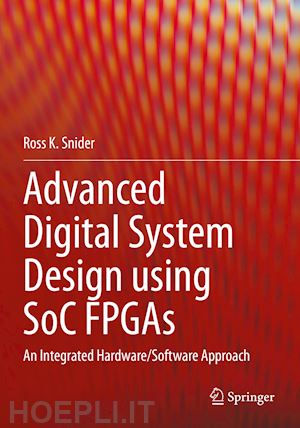

Questo prodotto usufruisce delle SPEDIZIONI GRATIS
selezionando l'opzione Corriere Veloce in fase di ordine.
Pagabile anche con Carta della cultura giovani e del merito, 18App Bonus Cultura e Carta del Docente
This textbook teaches students techniques for the design of advanced digital systems using System-on-Chip (SoC) Field Programmable Gate Arrays (FPGAs). The author demonstrates design of custom hardware components for the FPGA fabric using VHDL, with implementation of custom hardware-software interfaces. Readers gain hands-on experience by writing programs and Linux device drivers in C to interact with custom hardware. This textbook enables laboratory experience in the design of custom digital systems using SoC FPGAs, emphasizing computational tasks such as digital signal processing, audio, or video processing.
Introduction to SoC FPGAs.- Hello World.- Software Control of LEDs via Registers.- Audio Codec and headphone driver.- FIR Filtering.- Data Movements using Direct Memory Access (DMA).- Frequency Domain Processing using FFTs.- Time Domain Sound Effects Processors.- Frequency Domain Sound Effects Processor.- Hearing Aid.- Multiple Audio Personalities.
Ross Snider received his BSE degree in 1987 from Walla Walla College and his MSEE degree in 1990 from Michigan State University where for his Master's degree he implemented a speech recognition engine in C using Hidden Markov Models. During this time, the first Artificial Neural Network wave hit, but ANN's at the time couldn't perform any better than the HMM statistical models. Dr. Snider decided to spend time studying the real brain and got his PhD at Vanderbilt University in 1997 where he examined neural coding in the visual cortex. He then accepted a Post-Doctoral Fellowship at Johns Hopkins University where he looked at neural coding in the auditory cortex. Dr. Snider currently teaches courses in Digital Signal Processing and Field Programmable Gate Arrays (FPGAs) at Montana State University - Bozeman. His research activities take on a cross-disciplinary approach where he works on systems that are located at the intersection of computer engineering, signal processing, and biology.











Il sito utilizza cookie ed altri strumenti di tracciamento che raccolgono informazioni dal dispositivo dell’utente. Oltre ai cookie tecnici ed analitici aggregati, strettamente necessari per il funzionamento di questo sito web, previo consenso dell’utente possono essere installati cookie di profilazione e marketing e cookie dei social media. Cliccando su “Accetto tutti i cookie” saranno attivate tutte le categorie di cookie. Per accettare solo deterninate categorie di cookie, cliccare invece su “Impostazioni cookie”. Chiudendo il banner o continuando a navigare saranno installati solo cookie tecnici. Per maggiori dettagli, consultare la Cookie Policy.